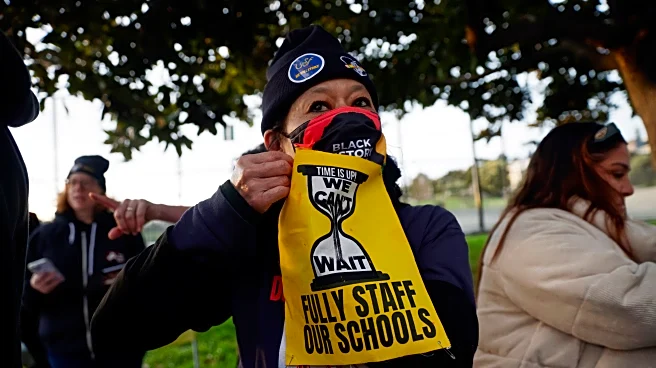What is the story about?
What's Happening?
Bill Condon's adaptation of 'Kiss of the Spider Woman' challenges the notion that a successful musical requires memorable songs. The film, based on the Broadway production, features music that is described as pleasant but forgettable. Despite this, the movie succeeds through strong characterizations and a sense of urgency. The story, set during Argentina's 'Dirty War' in 1983, follows Molina, a queer window dresser, and Valentín, a Marxist revolutionary, as they share a prison cell. Molina distracts from their grim reality by recounting the plot of his favorite movie, starring Ingrid Luna, played by Jennifer Lopez. The film balances fantasy and the harsh realities of Argentina's military dictatorship, offering a poignant contribution to the novel's legacy.
Why It's Important?
The film's success despite its musical shortcomings highlights the power of storytelling and character development in cinema. It offers a fresh perspective on gender and sexuality, resonating with contemporary audiences. The adaptation underscores the role of art and joy in resisting oppressive regimes, a theme relevant to current global political climates. By focusing on the relationship between Molina and Valentín, the film explores themes of resistance and the human capacity for compassion, providing a narrative that speaks to the struggles of vulnerable populations.
What's Next?
The film's release may spark discussions on the role of musicals in addressing serious political and social issues. It could influence future adaptations of similar works, encouraging filmmakers to prioritize narrative depth over musical appeal. The portrayal of complex characters and themes may inspire other creators to explore stories that challenge traditional genre conventions, potentially leading to a broader acceptance of diverse narratives in mainstream cinema.
Beyond the Headlines
The film's exploration of the intersection between art and political resistance offers a deeper understanding of how creative expression can serve as a form of protest. It raises questions about the impact of storytelling on societal change and the ways in which art can provide solace and hope in times of crisis. The adaptation's success may encourage a reevaluation of the cultural significance of musicals, particularly those that address historical and contemporary issues.

















